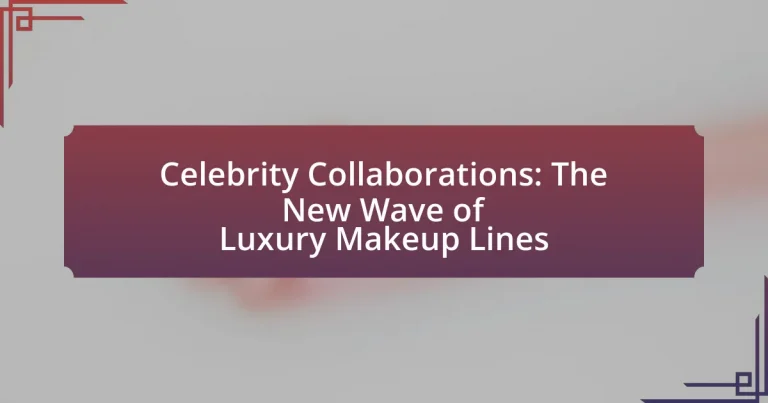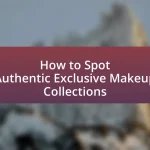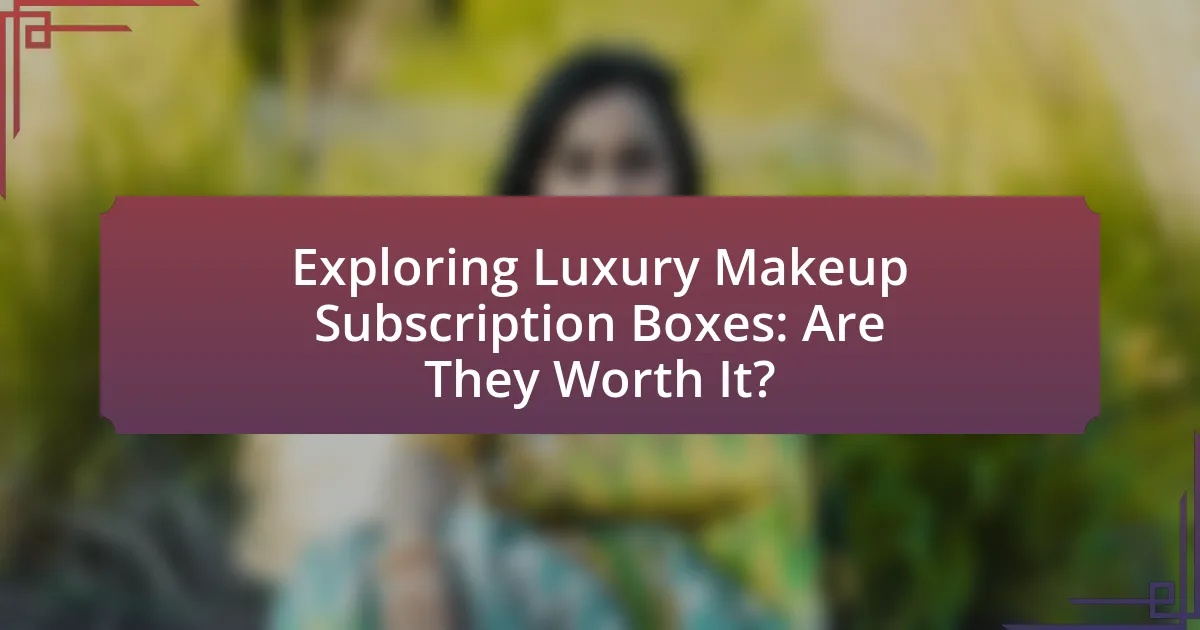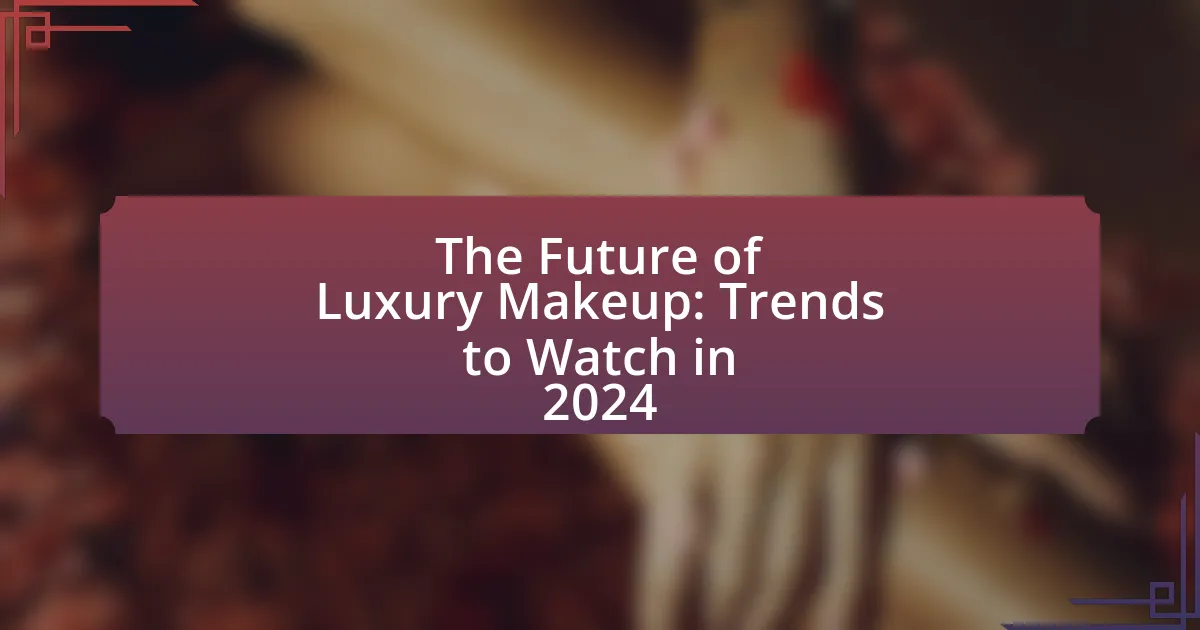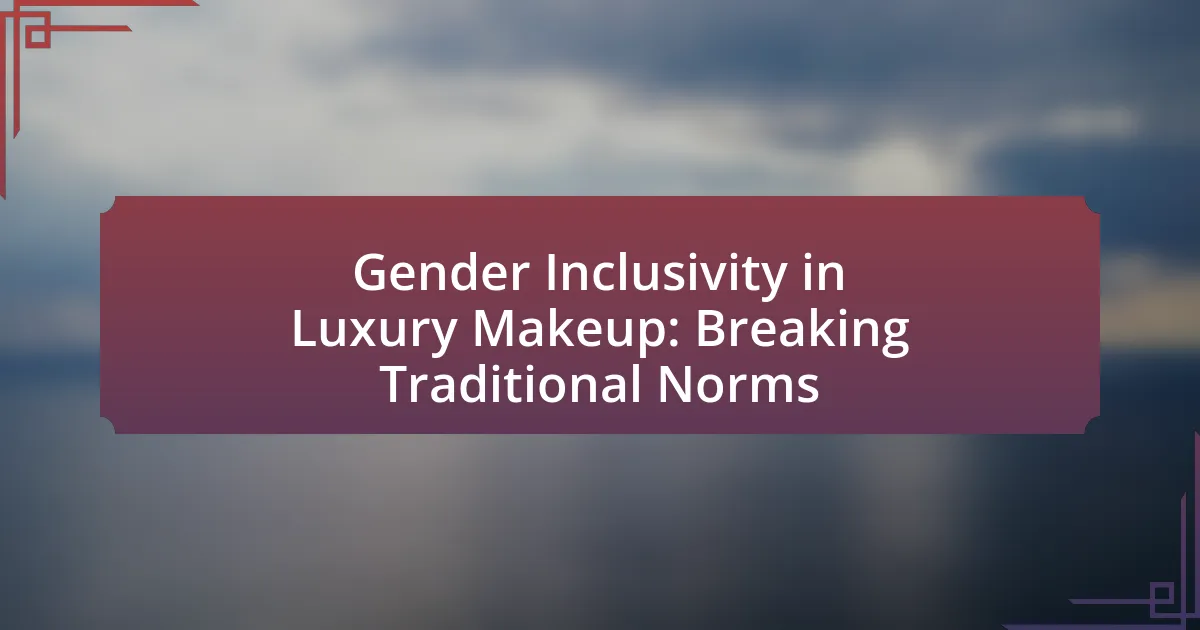Celebrity collaborations in luxury makeup lines represent strategic partnerships between high-profile celebrities and established cosmetic brands, aimed at creating exclusive products that leverage the celebrity’s influence to enhance brand visibility and drive sales. The article explores how these collaborations, exemplified by Rihanna’s Fenty Beauty and Kylie Jenner’s Kylie Cosmetics, have reshaped consumer perceptions and purchasing behaviors in the luxury makeup market. Key factors contributing to the success of these partnerships include brand alignment, audience engagement, and innovative marketing strategies, while also addressing the challenges and risks brands face, such as reputational damage and market saturation. Additionally, the article highlights current trends in celebrity collaborations, including inclusivity and sustainability, and outlines best practices for launching successful collaborations in the luxury makeup sector.
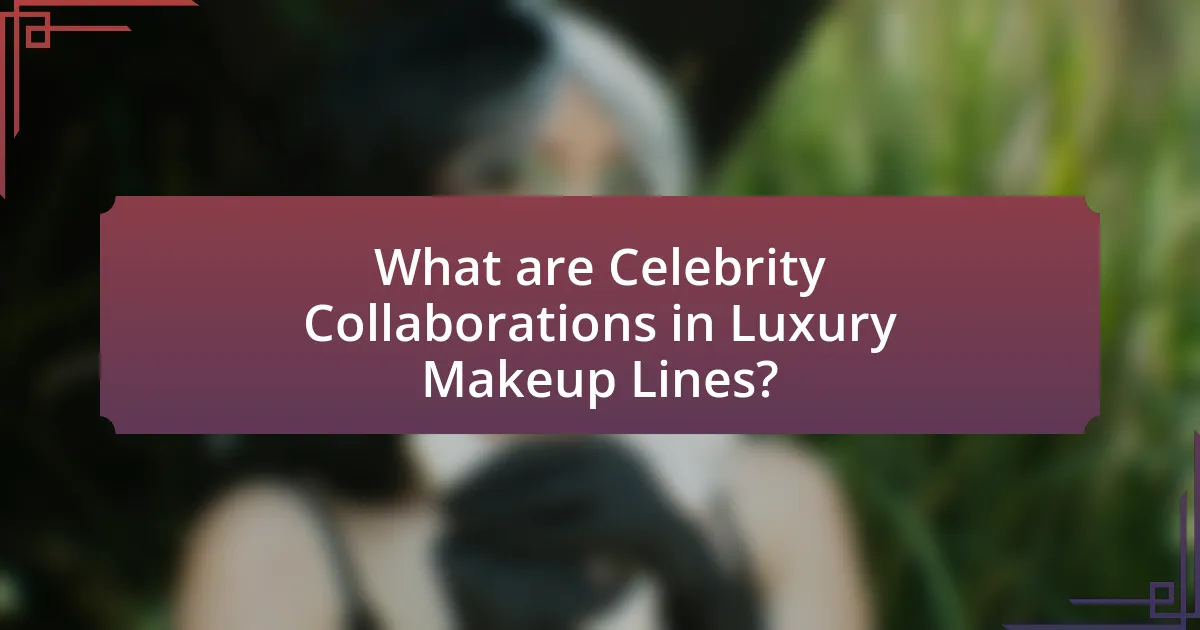
What are Celebrity Collaborations in Luxury Makeup Lines?
Celebrity collaborations in luxury makeup lines are partnerships between high-profile celebrities and established cosmetic brands to create exclusive makeup products. These collaborations leverage the celebrity’s influence and fanbase to enhance brand visibility and drive sales. For instance, Rihanna’s Fenty Beauty line, launched in 2017, revolutionized the industry by offering a diverse range of shades catering to all skin tones, which significantly boosted sales and set new standards for inclusivity in beauty. Such collaborations often result in limited-edition collections that generate buzz and excitement among consumers, further validating their effectiveness in the luxury makeup market.
How do celebrity collaborations influence the luxury makeup market?
Celebrity collaborations significantly enhance the luxury makeup market by driving brand visibility and consumer engagement. These partnerships leverage the celebrity’s influence and fan base, resulting in increased sales and brand loyalty. For instance, when Rihanna launched her Fenty Beauty line in collaboration with LVMH, it generated over $500 million in revenue within its first year, showcasing the financial impact of celebrity endorsements. Additionally, such collaborations often lead to innovative product offerings that resonate with consumers, as seen with Kylie Jenner’s Kylie Cosmetics, which quickly became a billion-dollar brand through strategic celebrity marketing. This trend illustrates how celebrity collaborations not only elevate brand prestige but also reshape consumer perceptions and purchasing behaviors in the luxury makeup sector.
What factors contribute to the success of these collaborations?
The success of celebrity collaborations in luxury makeup lines is primarily driven by brand alignment, audience engagement, and marketing strategies. Brand alignment ensures that the celebrity’s image and values resonate with the luxury brand, creating a cohesive identity that appeals to consumers. Audience engagement is crucial, as celebrities often have large, dedicated followings that can be leveraged to promote the product effectively. Additionally, innovative marketing strategies, such as social media campaigns and exclusive product launches, enhance visibility and desirability. For instance, the collaboration between Rihanna and Fenty Beauty achieved significant success by aligning with inclusivity and diversity, resulting in over $100 million in sales within the first 40 days of launch.
How do consumer perceptions of celebrities affect product sales?
Consumer perceptions of celebrities significantly influence product sales by shaping brand image and consumer trust. When consumers view a celebrity positively, they are more likely to purchase products endorsed by that celebrity, as seen in a study by the Journal of Advertising Research, which found that 70% of consumers are more inclined to buy a product when it is associated with a celebrity they admire. This effect is particularly pronounced in luxury makeup lines, where the perceived glamour and status of the celebrity can enhance the desirability of the product, leading to increased sales. Additionally, the emotional connection consumers feel towards celebrities can drive impulse purchases, further boosting sales figures in the beauty industry.
Why are luxury brands partnering with celebrities?
Luxury brands are partnering with celebrities to enhance brand visibility and appeal to a broader audience. This strategy leverages the celebrities’ influence and fan base, which can significantly boost brand recognition and desirability. For instance, collaborations like Rihanna’s Fenty Beauty have demonstrated that celebrity partnerships can lead to increased sales and market share, as they attract consumers who identify with the celebrity’s image and lifestyle. Additionally, research indicates that 70% of consumers are more likely to purchase a product endorsed by a celebrity they admire, highlighting the effectiveness of such collaborations in driving consumer behavior.
What advantages do luxury brands gain from celebrity endorsements?
Luxury brands gain significant advantages from celebrity endorsements, primarily through enhanced brand visibility and credibility. When a well-known celebrity endorses a luxury product, it attracts attention and elevates the brand’s status, as consumers often associate the celebrity’s image with quality and prestige. For instance, a study by the Journal of Advertising Research found that celebrity endorsements can increase brand recall by up to 50%, demonstrating their effectiveness in capturing consumer interest. Additionally, luxury brands benefit from the celebrity’s existing fan base, which can lead to increased sales and market reach. This strategic alignment not only boosts brand awareness but also fosters a sense of aspiration among consumers, further solidifying the luxury brand’s position in the market.
How do celebrities enhance brand visibility and appeal?
Celebrities enhance brand visibility and appeal by leveraging their influence and reach to attract consumer attention. Their established fan bases provide brands with immediate access to large audiences, significantly increasing brand awareness. For instance, a study by the NPD Group found that celebrity endorsements can lead to a 20% increase in sales for beauty products. Additionally, celebrities often embody aspirational lifestyles, which can enhance a brand’s image and desirability. This phenomenon is evident in luxury makeup lines, where collaborations with well-known figures like Rihanna and Selena Gomez have resulted in successful product launches and heightened consumer interest.
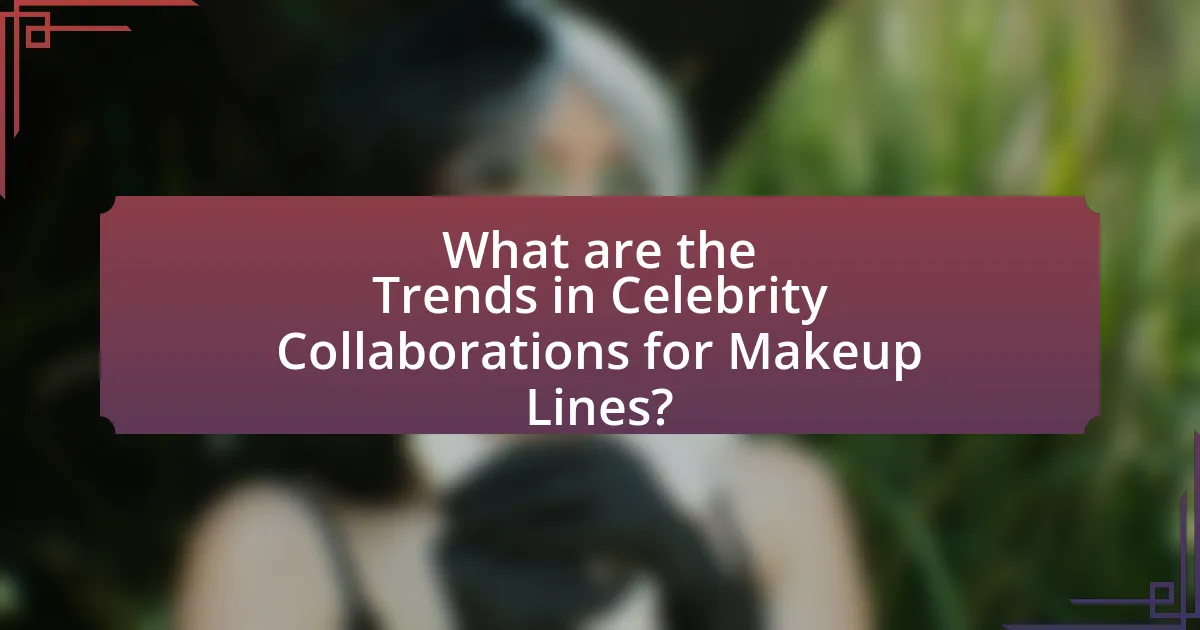
What are the Trends in Celebrity Collaborations for Makeup Lines?
Trends in celebrity collaborations for makeup lines include a focus on inclusivity, sustainability, and personalized products. Many celebrities are partnering with brands to create diverse shade ranges that cater to various skin tones, reflecting a growing demand for representation in the beauty industry. For instance, Rihanna’s Fenty Beauty launched with 40 foundation shades, setting a new standard for inclusivity. Additionally, sustainability is becoming a priority, with celebrities like Alicia Keys promoting eco-friendly packaging and clean ingredients. The rise of social media influencers as collaborators also highlights a shift towards more relatable and accessible beauty lines, as seen with collaborations like Kylie Jenner’s Kylie Cosmetics, which leverage direct engagement with fans. These trends indicate a significant evolution in how celebrity collaborations are shaping the makeup landscape.
How have recent collaborations changed the landscape of luxury makeup?
Recent collaborations between luxury makeup brands and celebrities have significantly transformed the luxury makeup landscape by introducing innovative products and expanding market reach. These partnerships leverage the celebrity’s influence and fanbase, resulting in increased brand visibility and consumer engagement. For instance, the collaboration between Rihanna’s Fenty Beauty and luxury makeup has set new standards for inclusivity, offering a diverse range of shades that cater to all skin tones, which has reshaped consumer expectations in the luxury segment. Additionally, collaborations often generate limited-edition collections that create urgency and exclusivity, driving sales and enhancing brand prestige. This shift reflects a broader trend where luxury brands are increasingly aligning with popular culture to remain relevant and appealing to younger consumers.
What innovative marketing strategies are being employed?
Innovative marketing strategies being employed in luxury makeup lines include celebrity collaborations, which leverage the star power of influencers to enhance brand visibility and credibility. These collaborations often result in limited-edition product launches that create urgency and exclusivity, driving consumer interest and sales. For instance, brands like Fenty Beauty, co-founded by Rihanna, have successfully utilized celebrity partnerships to tap into diverse consumer bases, resulting in significant market share growth. According to a report by NPD Group, the influence of celebrity endorsements has been shown to increase purchase intent by up to 50%, demonstrating the effectiveness of this strategy in the luxury makeup sector.
How are social media platforms influencing these collaborations?
Social media platforms are significantly influencing celebrity collaborations in luxury makeup lines by providing a direct channel for engagement and promotion. These platforms enable celebrities to showcase their products to a vast audience, leveraging their personal brands to drive consumer interest and sales. For instance, Instagram and TikTok allow influencers to create visually appealing content that highlights product features, leading to increased visibility and consumer trust. According to a 2021 study by McKinsey & Company, 70% of consumers reported that social media influences their purchasing decisions, underscoring the platforms’ role in shaping consumer behavior in the beauty industry.
What types of products are commonly launched through celebrity collaborations?
Celebrity collaborations commonly launch products such as cosmetics, fragrances, apparel, and accessories. These collaborations often leverage the celebrity’s brand and influence to create limited-edition makeup lines, skincare products, and fashion items that appeal to their fan base. For instance, Rihanna’s Fenty Beauty line revolutionized the makeup industry by offering a diverse range of shades, demonstrating the effectiveness of celebrity partnerships in creating successful beauty products.
Which makeup categories see the most collaboration activity?
The makeup categories that see the most collaboration activity are lip products, eyeshadow palettes, and highlighters. These categories frequently attract partnerships between brands and celebrities due to their high visibility and consumer demand. For instance, lip products often feature in collaborations because they allow for a wide range of colors and finishes, appealing to diverse consumer preferences. Eyeshadow palettes are popular for collaborations as they can showcase unique color stories and artistic designs, enhancing brand identity. Highlighters also see significant collaboration activity, as they cater to the growing trend of achieving radiant skin, making them a desirable product for celebrity endorsements.
How do product launches align with celebrity branding?
Product launches align with celebrity branding by leveraging the celebrity’s influence to enhance brand visibility and consumer trust. When a celebrity endorses a product, their established fan base often translates into immediate interest and sales for the product, as seen with brands like Fenty Beauty, founded by Rihanna, which achieved over $100 million in sales within its first 40 days due to her strong personal brand. This alignment creates a synergistic effect where the celebrity’s image and values resonate with the product, making it more appealing to consumers who identify with the celebrity.
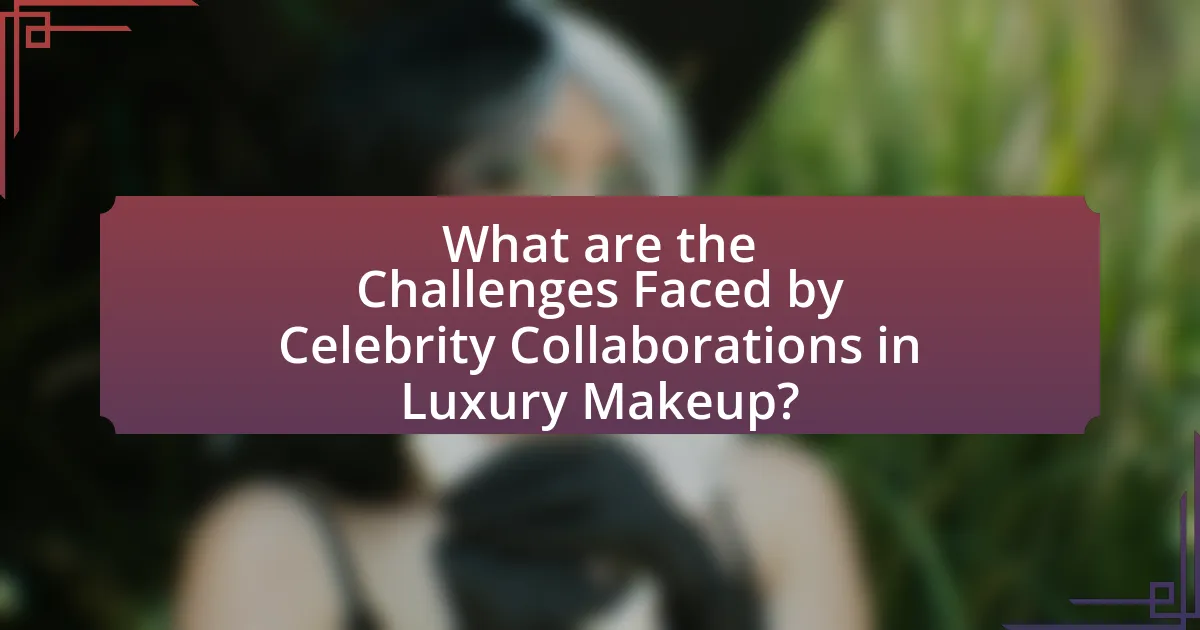
What are the Challenges Faced by Celebrity Collaborations in Luxury Makeup?
Celebrity collaborations in luxury makeup face several challenges, including brand alignment, consumer expectations, and market saturation. Brand alignment is crucial, as mismatches between a celebrity’s image and the luxury brand can lead to negative perceptions; for instance, if a celebrity is known for a casual style, their collaboration with a high-end brand may confuse consumers. Consumer expectations also pose a challenge; fans often expect products to reflect the celebrity’s personal style and quality, which can be difficult to achieve consistently. Additionally, market saturation complicates the landscape, as numerous celebrity collaborations flood the market, making it hard for new launches to stand out. According to a report by NPD Group, the influx of celebrity brands has led to increased competition, which can dilute the perceived exclusivity of luxury makeup lines.
What risks do brands encounter when collaborating with celebrities?
Brands encounter several risks when collaborating with celebrities, including reputational damage, misalignment of values, and potential legal issues. Reputational damage can occur if a celebrity engages in controversial behavior, which may lead to public backlash against the brand, as seen in cases like the fallout from celebrity scandals that negatively impacted associated brands. Misalignment of values can result in a disconnect between the celebrity’s image and the brand’s identity, potentially alienating the target audience; for instance, if a luxury makeup line partners with a celebrity known for promoting anti-luxury sentiments. Legal issues may arise from contract disputes or intellectual property concerns, which can lead to costly litigation and damage to the brand’s image. These risks highlight the importance of thorough vetting and alignment between the brand and the celebrity to mitigate potential negative outcomes.
How can negative publicity impact a collaboration?
Negative publicity can significantly undermine a collaboration by damaging the reputation of the involved parties. When a celebrity associated with a luxury makeup line faces negative media coverage, it can lead to decreased consumer trust and sales for the brand. For instance, a study by the Journal of Marketing Research found that negative publicity can reduce brand equity by up to 30%, illustrating the tangible financial impact on collaborations. Additionally, consumers may boycott products linked to the celebrity, further exacerbating the negative effects on the collaboration’s success.
What are the potential pitfalls of celebrity-driven marketing?
Celebrity-driven marketing can lead to several potential pitfalls, including brand misalignment, public backlash, and overexposure. Brand misalignment occurs when a celebrity’s image or values do not resonate with the target audience of the product, resulting in a disconnect that can harm brand perception. Public backlash can arise from a celebrity’s controversial actions or statements, which can negatively impact the associated brand, as seen in cases like the fallout from endorsements linked to celebrities involved in scandals. Overexposure happens when a celebrity endorses too many products, diluting their influence and making consumers skeptical of their authenticity, which can ultimately reduce the effectiveness of marketing campaigns. These pitfalls highlight the risks brands face when relying heavily on celebrity endorsements in their marketing strategies.
How do brands ensure successful collaborations with celebrities?
Brands ensure successful collaborations with celebrities by aligning their values and target audiences with those of the celebrity. This strategic alignment fosters authenticity, which is crucial for consumer trust and engagement. For instance, brands like Fenty Beauty have thrived by partnering with Rihanna, whose commitment to inclusivity resonates with the brand’s mission, resulting in significant sales growth and market presence. Additionally, brands conduct thorough market research to understand consumer preferences and leverage the celebrity’s influence effectively, as seen in collaborations that generate high social media engagement and brand visibility.
What criteria should brands consider when selecting a celebrity partner?
Brands should consider alignment with target audience, reputation, and engagement levels when selecting a celebrity partner. Alignment with the target audience ensures that the celebrity resonates with the brand’s consumers, enhancing authenticity and relatability. Reputation is crucial, as a celebrity’s public image can significantly impact the brand’s perception; for instance, partnerships with celebrities known for positive social influence can enhance brand credibility. Engagement levels, measured through social media following and interaction rates, indicate the celebrity’s ability to reach and influence potential customers effectively. According to a study by the Harvard Business Review, brands that choose celebrities with high engagement rates see a 20% increase in consumer interest compared to those with lower engagement.
How can brands maintain authenticity in celebrity collaborations?
Brands can maintain authenticity in celebrity collaborations by ensuring that the chosen celebrity aligns with their core values and target audience. This alignment fosters genuine connections, as consumers are more likely to trust collaborations that reflect shared beliefs and aesthetics. For instance, when Fenty Beauty partnered with Rihanna, the brand emphasized inclusivity, which resonated with Rihanna’s personal brand and her advocacy for diversity in beauty. This strategic alignment not only enhances credibility but also strengthens consumer loyalty, as evidenced by Fenty Beauty’s rapid growth and positive reception in the market.
What are the best practices for launching a celebrity collaboration in luxury makeup?
The best practices for launching a celebrity collaboration in luxury makeup include thorough market research, strategic partnership selection, and effective marketing strategies. Conducting market research helps identify target demographics and consumer preferences, ensuring the collaboration aligns with market demands. Selecting a celebrity whose brand values and image resonate with the luxury makeup line enhances authenticity and appeal. Effective marketing strategies, such as leveraging social media platforms and influencer partnerships, can amplify reach and engagement, driving sales. For instance, collaborations like Rihanna’s Fenty Beauty have demonstrated the power of aligning celebrity influence with consumer trends, resulting in significant market impact and sales success.
How can brands effectively leverage social media for product launches?
Brands can effectively leverage social media for product launches by creating targeted campaigns that engage their audience through interactive content and influencer partnerships. Engaging content, such as behind-the-scenes videos, countdowns, and live Q&A sessions, can generate excitement and anticipation among potential customers. Collaborating with influencers who resonate with the brand’s target demographic can amplify reach and credibility, as studies show that 49% of consumers depend on influencer recommendations for their purchasing decisions. Additionally, utilizing platform-specific features, like Instagram Stories or TikTok challenges, can enhance visibility and encourage user-generated content, further promoting the product launch.
What strategies can enhance consumer engagement during a collaboration launch?
To enhance consumer engagement during a collaboration launch, brands should implement interactive social media campaigns that encourage user participation. These campaigns can include contests, polls, and live Q&A sessions, which foster a sense of community and excitement around the collaboration. For instance, a study by Sprout Social found that 70% of consumers feel more connected to brands that engage with them on social media, highlighting the effectiveness of interactive strategies in building consumer relationships. Additionally, leveraging influencer partnerships to amplify the collaboration’s reach can significantly increase visibility and engagement, as influencers often have established trust with their audiences.
